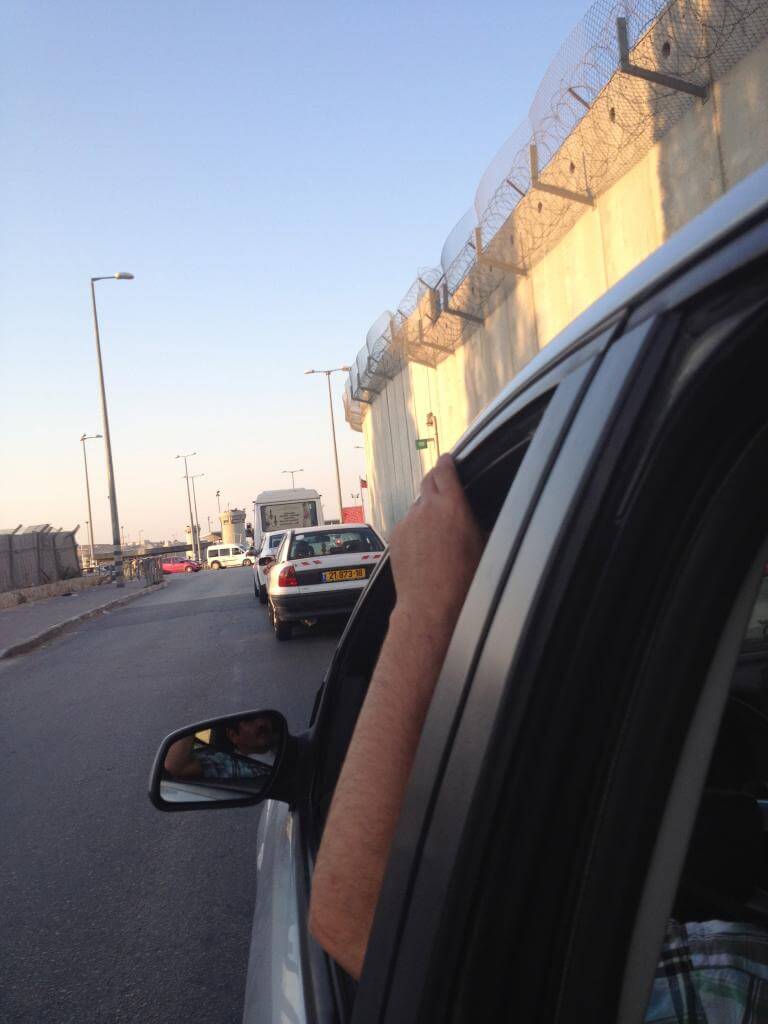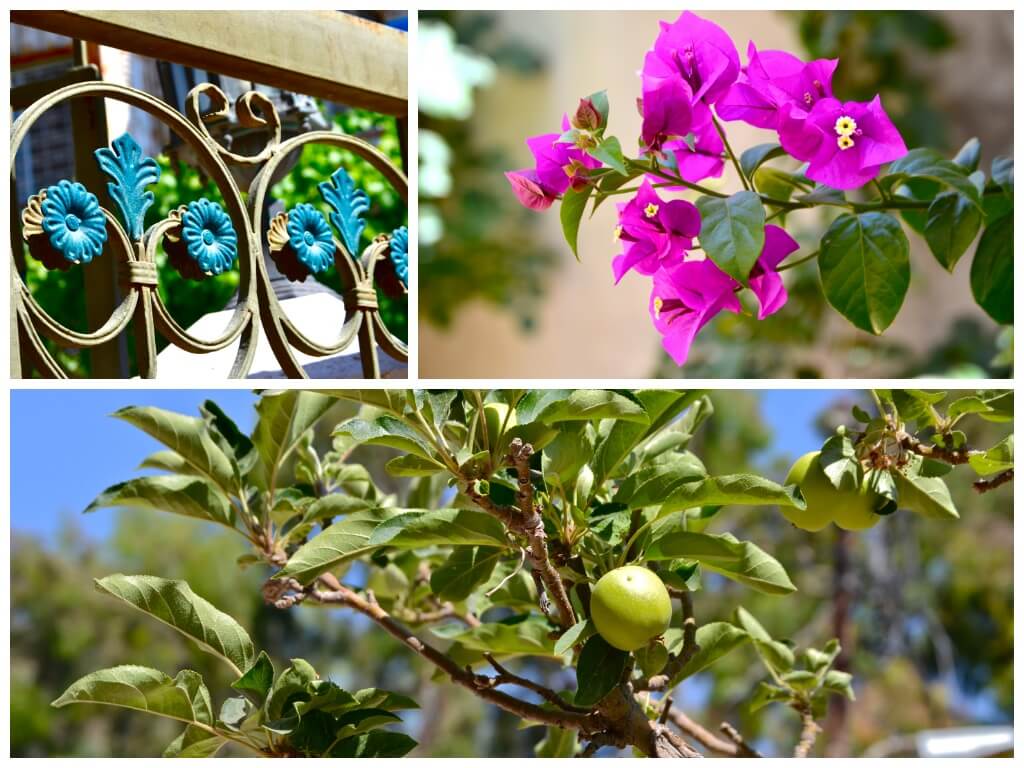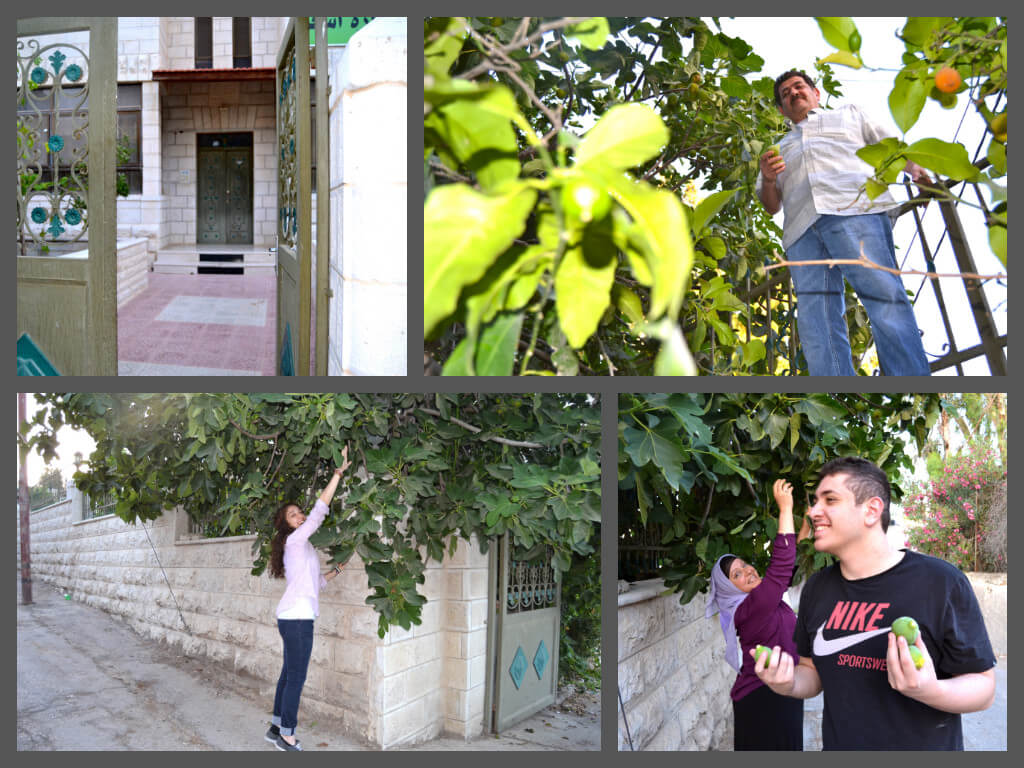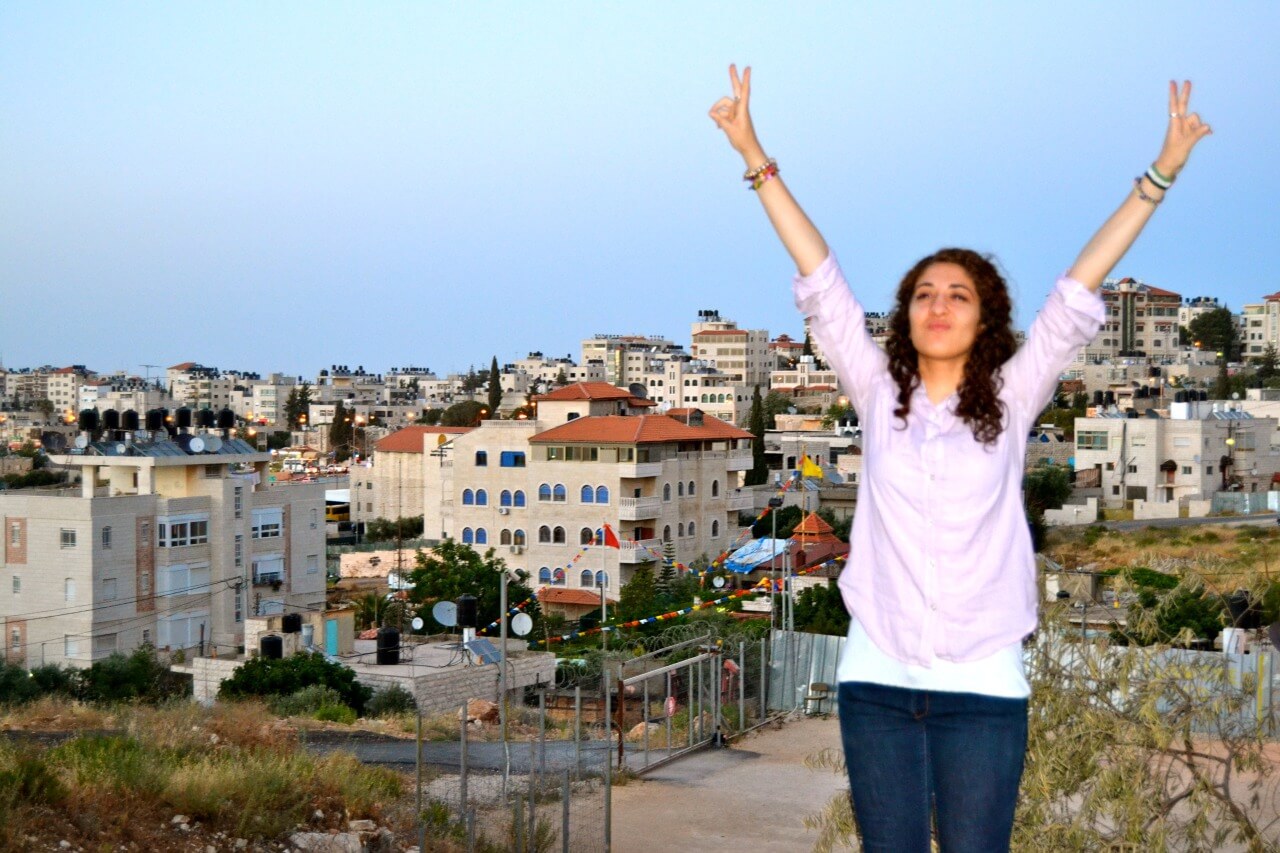If I close my eyes, just for a moment, I can still remember the way the wind in Palestine felt when it brushed against my cheeks on one of those really breezy days — those days when I’d walk out of my family’s Beit Hanina, Jerusalem home just to feel it, even if for a brief slice of time.
I’d sit on our steps, chin resting on my hands in pure silence and breathe it in. I was alone, but I wasn’t lonely. The wind — it hit my face just right. It was cool; just enough to wake me up in the brisk, dewy summer mornings, like a splash of cold water. But it embraced me tightly and lit a fire in my insides, similar to how the fresh tea brewed at the village’s nearest teahouse warmed me up.
It was soft, yet resilient. Amazing how on such scorching hot days of more than 90-degree weather, the breeze was still there. And there was life in it.
I watched our front yard fig trees sway back and forth, almost as if their roots were made of rubber. Despite the heat and dry climate, they did not die. Their life depended on something else. But the wind, it had so much power over their movement. It commanded them to move, and they did.
I often think of Palestinians and their undying strength as that wind — pushing through their pain as they live their lives under brutal occupation, and constantly wondering if they will stay safe from Israel’s relentless missiles and bombs. They are forced to bury their family members and watch Israel demolish their homes — once tall, sturdy buildings, now ashes and a floating dust of memories.
But many do not believe these tragedies occur unless they visit Palestine and witness them.
If they did, they’d see our hills and mountains – once sanctuaries where homes resided, where olive trees sprouted and served as sources of economy – swallowed up by illegal Israeli settlements, and settlers planting their own roots on Palestinian soil. They’d see how Palestinians are brought to their knees by a force that suffocates them in every aspect of their lives, as Israel controls the air, sea and ground.

Palestinians’ rights are not important to Israel, whose hands are around their necks, squeezing until the wind is ultimately gone. Daily torture, constant home raids and kidnappings, humiliation in barbed wire checkpoints are all procedures put in place by Israel for Palestinians, whether they’re on their way to the nearest market or simply attempting to travel their country, but are restricted by “The Wall.”
And they are expected to comply.
I experienced this firsthand as a Palestinian-American the summer of 2013. It took me a long time to build the courage and strength to release these words – aching memories still haunt me, chasing each sentence I string together. It’s like pins and needles. But I’ve realized this needs to be said, as the injustice I faced is still very real, and continues to happen today.
It was my first trip to my homeland in 13 years, with my first being in 2000. Within minutes of getting off my 12-hour flight and entering the Ben Gurion Airport, I felt that strong Palestine breeze on me. But it felt more like it was tying itself around my stomach and squeezing hard.
Horror stories relayed to me by family and friends locked in airport interrogation rooms and later forced back to the U.S. for “security reasons,” separated from their families and birth land, played like a skipping movie reel in my head.
And it became my reality.
Upon entering the airport, officials separated me from my parents and brother, and forced me in a room with at least 50 other Palestinians attempting to visit the country. Each of us waited our turn to be called into another room, where I was eventually interrogated for hours, questioned about my reason for coming and forced to reveal personal information. I was forced to hand over my email addresses and phone numbers, or else they would put me back on that 12-hour flight to Cleveland, Ohio without my family.
I glanced at my U.S. passport resting in my palm and peeled through its contents out of nervousness as I awaited my fate, when I stumbled upon the first page that read:
“The Secretary of State of the United States of America hereby requests all whom it may concern to permit the citizen/national of the United States named herein to pass without delay or hindrance and in case of need to give all lawful aid and protection.”
How ironic. And how little this “request” is valued in the State of Israel.
I peered through a slit in the door as non-Palestinians moved freely through the airport, not having to be questioned or interrogated. I wondered what it was like to feel human in that moment. The discrimination I and other Palestinians were facing – and the foundation Israel has built itself on – were clear, but this was hidden from those outside that room, just as Israel attempts to veil the oppression it hangs over Palestinians.
I remember looking around in that tiny, stuffy room. So vividly I recall the expressions of others awaiting their fate, solemn and sad, as they sat on their suitcases. The faces of those who were told they’d not be granted access into their country permanently burned in my memory. At that moment, my heart grew hard, black and heavy. I was livid.
Officials eventually deemed me “safe” enough to enter the country. I remember crying in the taxi on our way to our home. “I want to leave,” I told my dad, my face streaked with tears. I couldn’t wake up every day during our month-long trip and be treated this way, and watch my people get treated this way. I had dedicated my life to unveiling the truth behind the oppression Palestinians face, but actually witnessing it ignited a fire in me, a blaze I couldn’t extinguish no matter how hard I tried. I couldn’t grapple with reality.
The next morning, my dad and I stood outside our home waiting for a taxi to take us to Ramallah. My heart still ached from the day before, but my dad seemed calm. I watched in confusion as he leaned against the creaking emerald gate to our home, hand in his pocket while he stared at the beaming sun. His calmness amid all of the chaos angered me. The jumbled thoughts looping in my head finally spilled out as frantic questions.
“How do you deal with this every year you travel to Palestine?” I blurted. “Doesn’t it hurt you every time they bully us, put us down, treat us as if we’re worthless? How can you continue to come?”
My dad looked at me seriously. The change in his usual light personality caught me off guard. The wind blew into his face and he winced before saying something I will never forget.
“When we return every year, that is how we fight,” he said softly. “If we keep returning, we show them that this is our home. And we’re not giving it up.”
At that moment, something changed within me. I felt my heart grow softer – stronger, even. A grin slowly replaced my somber expression, and I nodded. I understood.
Like the wind resists the tide, I resisted the oppression just by being there.

From then on, I smiled in the faces of Israeli soldiers who stopped us at checkpoints and forced entry into our rental car, demanding our passports and rummaging through our truck. I laughed in the faces of the emotionless soldiers who lined us up like animals and forced us to wait in caged checkpoints on our way home from Ramallah. We were closed off from the outside world by barbed walls made of sharp daggers – a pure intent to make us feel like barbarians. But I looked them right in the eyes and gleamed as they checked all our bags.
As my family walked down the Old City’s streets, the Jewish-only, Jim Crow-esque segregated buses passed us, seemingly mocking us. But I smirked, because what Israel seems to forget is, we are like the wind. And nobody can break the wind.
It is easy for non-Palestinians to deem Israel’s “regulations” as “security measures.” But what they fail to mention is only Palestinians are subject to them – even Palestinian-Americans, who were born in America, like myself, cannot move freely in the homeland where their ancestors once roamed without borders.
These are merely – and in brevity – my experiences while visiting my homeland, but it is not nearly as horrifying as the struggles Palestinians living there encounter daily.
I can use this space to relay countless facts proving war crimes committed by Israel, including the more than 2,000 Palestinian civilians – mostly women, children and elderly people – killed in Israel’s most recent onslaught and brutalization on the Gaza Strip in July. I can discuss the 520,000 who may have been displaced, and of those, 485,000 in need of emergency food assistance, according to the United Nations Office for the Coordination of Humanitarian Affairs. In October the UN Relief and Works Agency (UNRWA) assessed an estimated 100,000 homes were damaged or destroyed, affecting more than 600,000 people and driving the homelessness rate.
In a perfect world, these facts would be sufficient evidence to garner an overwhelming amount of Palestinian support, end the billions of dollars in aid the U.S. provides to Israel every year, and, subsequently, end the occupation.
But this is not a perfect world. And these Palestinians who have lost their lives are not statistics that can be tallied and forgotten. And despite a ceasefire declared on Aug. 26, and simply because the media has halted their reporting on it, does not mean Israel’s war on Palestine has ended. Palestinians are still occupied and living under overt oppression.
In Israel, the lives of Palestinians are valued to nothing.

Yet we are resilient, and we are something. We are human despite Israel’s constant attempts to make the world believe otherwise. Our presence – our identity – is alive because like the wind, we do not budge; we do not accept anything less than human rights. With each innocent Palestinian that dies at the hands of Israel’s occupation, that is every one of us – Palestinian or not – who has ever felt their human rights were besieged.
And that is why we still exist. That is why we do not falter. We cannot allow those who look down upon us with condescending eyes to tell us we are not real or that our blood does not matter.
There are moments where we may feel defeated by those attempting to break us, similar to how I felt during my last trip to Palestine. Each time those thoughts arise, I remember the strength of my people under siege, and the smiles they flashed me as I walked by ailing refugee camps or rows of Israeli settlements that were once their land.
Our worth screams volumes.
That summer, I briefly witnessed my soul lose faith in humanity and the moral good believed to be embedded in every person by birth. What helped me regain conviction was knowing the breeze of freedom will be ours again. But we must not allow it to be stolen. It is ours by nature, by history. It is ours by fate, and nothing, nothing can touch fate.
Sometimes, I sit on the steps of my home in Cleveland, Ohio and I feel a gust of wind come through; I am transported to Palestine. I remember how it felt to forget the chaos that surrounded, swallowed me. The strong grip of painful memories, which tug on my heart strings in an attempt to devalue me, lets go.
As the breeze blows strands of hair from my face, my head is clear. I grin, because as poet Rafeef Ziadah echoed, Palestinians teach life every day. And we mustn’t forget that we are the wind. And if we know anything about the wind, we know its freedom can never be stolen.




beautiful and strong. thank you!
;)
“How do you deal with this every year you travel to Palestine?” I blurted. “Doesn’t it hurt you every time they bully us, put us down, treat us as if we’re worthless? How can you continue to come?”
“My dad looked at me seriously. The change in his usual light personality caught me off guard. The wind blew into his face and he winced before saying something I will never forget.
““When we return every year, that is how we fight,” he said softly. “If we keep returning, we show them that this is our home. And we’re not giving it up.”
This is a beautiful essay, thank you. And thank you for reminding me of the great Rafeef Ziadah. Here she is, reading her poem, “We Teach Life, Sir.”
https://www.youtube.com/watch?v=aKucPh9xHtM
You have learned well from your intrepid father, Samah, and embody the steadfastness and resilience of being Palestinian and of Palestine.
“I grin, because as poet Rafeef Ziadah echoed, Palestinians teach life every day. And we mustn’t forget that we are the wind. And if we know anything about the wind, we know its freedom can never be stolen.”
Many stand with you in solidarity, and our numbers are steadily growing.
“It took me a long time to build the courage and strength to release these words – aching memories still haunt me, chasing each sentence I string together. It’s like pins and needles. But I’ve realized this needs to be said, as the injustice I faced is still very real, and continues to happen today. ”
I am grateful that you have chronicled this important testimony. It’s part of the living history that needs to be known and never forgotten~ not for one minute.
Your words are profound and lyrical. Your photos are gorgeous, as are your smiles…….
Wow. What an eloquent, moving story Samah. Voices like yours bring alive the sense of struggle, steadfastness and hope against apparently insurmountable odds in the face of oppression that is the daily reality of Palestinians living under Israeli occupation. Paraphrasing what your father so wisely said; in the face of such dire circumstances, existence itself is the ultimate form of resistance.
I hope many more people read your powerful words and allow their hearts to be moved by such a magnificent display of dignity and humanity. Thank you for allowing us a glimpse into your beautiful spirit!!!!
Samah,
It’s not fast enough and it’s not soon enough but, ike the wind, you WILL be free!
I’m ABSOLUTELY stunned by how much has changed in the US and globally in the past 10 years.
In truth, much has changed while so much has stayed the same. Yet, if the past 10 years are any measure, great and good changes are afoot.
Having your identity reaffirmed is a gentle, warm breeze in the winds of change,
We are with you.